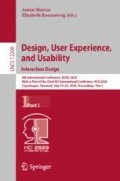Abstract
Adaptive navigation intends to guide users to their specific objectives within the application by altering the normal way the application allows to navigate, aiming to provide better experience for users with diverse needs and in different context conditions. Knowledge about activities that the user performs at runtime is crucial for adaptation decision making. It not only serves as a basis for evaluating relevance of the available information (such as user status, usage patterns, and context of use), but also facilitates reasoning about user needs. However, implementation of the user activity tracking capability often relies on intimate knowledge of the target application, which makes it difficult to develop loosely coupled modules to address separate concerns. In this paper, we describe a reusable approach to the development of the user activity tracking capability with the intent to support adaptive navigation. We use aspect-oriented instrumentation to capture user interface events and conduct model-based analysis to identify tasks that the user performs. A proof-of-concept experiment shows that our approach makes it possible to develop adaptation code that is reusable when the user interface and its adaptation logic evolve.
Access this chapter
Tax calculation will be finalised at checkout
Purchases are for personal use only
References
Tao, Y.: Toward computer-aided usability evaluation for evolving interactive software. In: Proceedings of the International Workshop on Reflection, AOP and Meta-Data for Software Evolution, 21st European Conference on Object-Oriented Programming (ECOOP 2007), Berlin, Germany (2007)
Hilbert, D.M., Redmiles, D.F.: Extracting usability information from user interface events. Comput. Surv. 32(4), 384–421 (2000)
Brusilovsky, P.: Adaptive navigation support. In: Brusilovsky, P., Kobsa, A., Nejdl, W. (eds.) The Adaptive Web. LNCS, vol. 4321, pp. 263–290. Springer, Heidelberg (2007). https://doi.org/10.1007/978-3-540-72079-9_8
Tao, Y.: Grammatical analysis of user interface events for task identification. In: Marcus, A. (ed.) DUXU 2014. LNCS, vol. 8517, pp. 197–205. Springer, Cham (2014). https://doi.org/10.1007/978-3-319-07668-3_20
Grudin, J.: The case against user interface consistency. Commun. ACM 32, 1164–1173 (1989)
Gullà, F., Ceccacci, S., Germani, M., Cavalieri, L.: Design adaptable and adaptive user interfaces: a method to manage the information. In: Andò, B., Siciliano, P., Marletta, V., Monteriù, A. (eds.) Ambient Assisted Living. BB, vol. 11, pp. 47–58. Springer, Cham (2015). https://doi.org/10.1007/978-3-319-18374-9_5
Buhagiar, A.J., Pace, G.J., Eberjer, J.: Engineering adaptive user interface using monitoring-oriented programming. In: IEEE QRS-C, pp. 200–207, 25–29 July 2017
Ceaparu, I., Lazar, J., Bessiere, K., Robinson, J., Shneidenman, B.: Determining causes and severity of end-user frustration. Int. J. Hum.-Comput. Interact. 17, 333–356 (2004)
Castillejo, E., Almeida, A., López-de-Ipiña, D.: User, context and device modeling for adaptive user interface systems. In: Urzaiz, G., Ochoa, S.F., Bravo, J., Chen, L.L., Oliveira, J. (eds.) UCAmI 2013. LNCS, vol. 8276, pp. 94–101. Springer, Cham (2013). https://doi.org/10.1007/978-3-319-03176-7_13
Quade, M.: Model-based evaluation of adaptive user interfaces. In: Wichert, R., Van Laerhoven, K., Gelissen, J. (eds.) AmI 2011. CCIS, vol. 277, pp. 318–322. Springer, Heidelberg (2012). https://doi.org/10.1007/978-3-642-31479-7_54
Blumendorf, M., Lehmann, G., Albayrak, S.: Bridging models and systems at runtime to build adaptive user interfaces. In: EICS, pp. 9–18. ACM (2011)
Ramirez, A.J., Cheng, B.: Design patterns for developing dynamically adaptive systems. In: SEAMS, pp. 49–58. ACM (2010)
Nilsson, E.G., Floch, J., Hallsteinsen, S., Stav, E.: Using a patterns-based modelling language and a model-based adaptation architecture to facilitate adaptive user interfaces. In: Doherty, G., Blandford, A. (eds.) DSV-IS 2006. LNCS, vol. 4323, pp. 234–247. Springer, Heidelberg (2007). https://doi.org/10.1007/978-3-540-69554-7_19
Jason, B., Calitz, A., Greyling, J.: The evaluation of an adaptive user interface model. In: SAICSIT, pp. 132–143. ACM (2010)
Akiki, P.A., Bandara, A.K., Yu, Y.: Adaptive model-driven user interface development systems. ACM Comput. Surv. 47(1), 9:1–9:33 (2014)
David, P.-C., Ledoux, T.: An aspect-oriented approach for developing self-adaptive fractal components. In: Löwe, W., Südholt, M. (eds.) SC 2006. LNCS, vol. 4089, pp. 82–97. Springer, Heidelberg (2006). https://doi.org/10.1007/11821946_6
Shekh, S., Tyerman, S.: An aspect-oriented framework for event capture and usability evaluation. In: Maciaszek, L.A., González-Pérez, C., Jablonski, S. (eds.) ENASE 2008. CCIS, vol. 69, pp. 107–119. Springer, Heidelberg (2010). https://doi.org/10.1007/978-3-642-14819-4_8
Shneiderman, B.: Designing the User Interfaces, pp. 74–76. Addison Wesley, Boston (2005)
Gajos, K.: Making the web more inclusive with adaptive user interfaces. In: Engineering Interactive Computing Systems (EICS). ACM (2014)
Brusilovsky, P., Maybury, M.T.: From adaptive hypermedia to the adaptive web. Commun. ACM 45(5), 31–33 (2002)
Kiczales, G., et al.: Aspect-oriented programming. In: Akşit, M., Matsuoka, S. (eds.) ECOOP 1997. LNCS, vol. 1241, pp. 220–242. Springer, Heidelberg (1997). https://doi.org/10.1007/bfb0053381
Author information
Authors and Affiliations
Corresponding author
Editor information
Editors and Affiliations
Rights and permissions
Copyright information
© 2020 Springer Nature Switzerland AG
About this paper
Cite this paper
Tao, Y. (2020). A Reusable Approach to Software Support for Adaptive Navigation. In: Marcus, A., Rosenzweig, E. (eds) Design, User Experience, and Usability. Interaction Design. HCII 2020. Lecture Notes in Computer Science(), vol 12200. Springer, Cham. https://doi.org/10.1007/978-3-030-49713-2_19
Download citation
DOI: https://doi.org/10.1007/978-3-030-49713-2_19
Published:
Publisher Name: Springer, Cham
Print ISBN: 978-3-030-49712-5
Online ISBN: 978-3-030-49713-2
eBook Packages: Computer ScienceComputer Science (R0)

